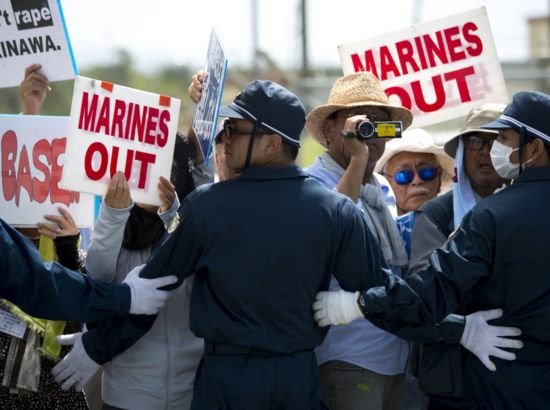
Investigations launched amid renewed scrutiny of US military conduct in Japan following local crackdowns and rising public anger.
Two US marines stationed in Okinawa are under investigation for allegedly raping Japanese women in separate incidents that occurred within military bases. The accusations have emerged just days after local authorities intensified efforts to curb crimes by US personnel on the island.
One marine, in his 20s, is suspected of sexually assaulting a woman in a bathroom at a US base last month. A second marine, also in his 20s, allegedly committed a similar crime in January. Reports indicate that the first suspect also injured a second woman who attempted to intervene.
Japanese prosecutors have received referrals for both cases, though the identities of the accused have not been made public.
Denny Tamaki, the governor of Okinawa and a vocal critic of the US military presence, condemned the alleged attacks. He urged US officials to take “thorough measures” to prevent such incidents, calling the reports “deplorable” and damaging to community relations.
George Glass, the newly appointed US ambassador to Japan, expressed deep concern over the allegations. In his statement, he emphasized the importance of maintaining trust between the American military and local residents:
“We deeply value our decades-long relationship with our Japanese hosts and are committed to ensuring incidents like these do not undermine those bonds.”
Okinawa hosts the majority of the US military presence in Japan, with more than half of the 47,000 American troops stationed there. In 2024 alone, 80 individuals affiliated with the US military were charged with various crimes on the island.
Three US servicemen have faced indictments related to sexual offenses since June last year.
The latest allegations revive memories of past incidents, including the 1995 gang rape of a 12-year-old Japanese girl by US servicemen, which sparked widespread protests and demands for troop reductions. Despite plans in 2012 to relocate thousands of marines and shift bases away from civilian areas, implementation has been slow and met with political resistance.
In a symbolic move toward cooperation, US military officials and Japanese police last week conducted a joint patrol near a popular nightlife district — the first of its kind since 1974. The patrols come amid broader concerns about Chinese military expansion and North Korean threats, which both governments cite as justification for maintaining the US presence.